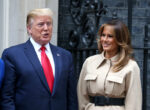Prince Harry faced intense criticism this week after traveling more than 12,000 miles round-trip to Shanghai on May 26 to promote sustainable travel practices, with critics denouncing his actions as hypocritical given the massive carbon emissions generated by his journey.
The Duke of Sussex made a surprise appearance at the Envision 2025 Global Partner Conference in Shanghai, where he urged the travel industry to embrace eco-friendly practices and reach previously established goals of halving carbon pollution by 2030. Harry spoke in his capacity as founder of Travalyst, a company that promotes sustainable travel by developing tools that display carbon pollution levels when booking flights online.
Royal correspondent Jennie Bond highlighted the contradiction in Harry’s approach, stating that “the irony of flying across the world to promote sustainable, environmentally friendly travel is hard to ignore.” Bond suggested that a video speech would have been more ethical than making the transcontinental journey.
The environmental impact of Harry’s trip has drawn particular scrutiny from critics. According to calculations from the Department for Energy Security and Net Zero, a typical first-class passenger on a round-trip flight between Los Angeles and Shanghai is responsible for about 6311.32 kilograms, or 6.31 metric tons, of greenhouse gas emissions. However, speculation that Harry may have used a private jet for the conference could mean his carbon footprint was 10 to 100 times higher, as private jets represent one of the most environmentally damaging methods of travel.
During his presentation, Harry emphasized the travel industry’s responsibility to environmental stewardship. He indicated that this moment represents a critical time for the industry to reaffirm its commitment to being a force for good, noting that the true measure of commitment becomes apparent when facing difficult challenges.
This controversy represents a recurring pattern for Harry, who has previously faced criticism for his travel habits despite his environmental advocacy. When Travalyst launched in 2019, he defended his use of private jets by explaining that he travels commercially 99% of the time, but occasionally unique circumstances require alternative arrangements to ensure his family’s safety.
Harry and his wife Meghan Markle have positioned themselves as prominent climate activists, with their Archewell Foundation pledging to reach net zero emissions by 2030. Markle has also gained recognition for her sustainable fashion choices, further emphasizing the couple’s public commitment to environmental causes.
Critics have expressed frustration with what they perceive as a double standard in Harry’s approach to environmental advocacy. Social media commenters have characterized his actions as embodying a “for thee, not for me” mentality, suggesting that he promotes restrictions and sustainable practices for others while maintaining his own carbon-intensive lifestyle.
The backlash extends beyond environmental concerns to broader questions about Harry and Meghan’s approach to public engagement since stepping back from royal duties. The couple has faced similar criticism following their recent international trips, including their four-day tour of Colombia in August 2024, which also generated controversy over costs and the couple’s apparent attempt to conduct quasi-royal visits.
Sources close to the couple indicated they felt embarrassed by the negative reaction to their Colombia trip, particularly as they encountered similar criticism following their visit to Nigeria. The sources suggested that Harry and Meghan remain committed to conducting international engagements because they believe their profile can effectively highlight important global issues, while also acknowledging that such trips help elevate their status in Hollywood and support their brand development.
The Shanghai conference appearance underscores the challenges Harry faces as he attempts to balance his environmental advocacy with the practical realities of maintaining an international public profile. Critics argue that his failure to practice what he preaches undermines his credibility as a climate advocate and calls into question the sincerity of his environmental commitments.
This latest controversy comes as Harry continues to navigate his post-royal identity, with observers noting the apparent contradiction between his desire to promote global causes and the carbon-intensive lifestyle required to maintain his international presence. The criticism highlights the broader challenges facing high-profile environmental advocates who must reconcile their public messaging with their personal travel patterns and lifestyle choices.








